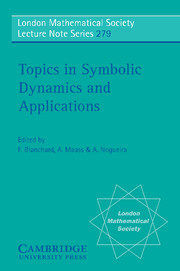Book contents
- Frontmatter
- Contents
- FOREWORD
- 1 SEQUENCES OF LOW COMPLEXITY: AUTOMATIC AND STURMIAN SEQUENCES
- 2 SUBSTITUTION SUBSHIFTS AND BRATTELI DIAGRAMS
- 3 ALGEBRAIC ASPECTS OF SYMBOLIC DYNAMICS
- 4 DYNAMICS OF ℤd ACTIONS ON MARKOV SUBGROUPS
- 5 ASYMPTOTIC LAWS FOR SYMBOLIC DYNAMICAL SYSTEMS
- 6 ERGODIC THEORY AND DIOPHANTINE PROBLEMS
- 7 NUMBER REPRESENTATION AND FINITE AUTOMATA
- 8 A NOTE ON THE TOPOLOGICAL CLASSIFICATION OF LORENZ MAPS ON THE INTERVAL
3 - ALGEBRAIC ASPECTS OF SYMBOLIC DYNAMICS
Published online by Cambridge University Press: 05 August 2013
- Frontmatter
- Contents
- FOREWORD
- 1 SEQUENCES OF LOW COMPLEXITY: AUTOMATIC AND STURMIAN SEQUENCES
- 2 SUBSTITUTION SUBSHIFTS AND BRATTELI DIAGRAMS
- 3 ALGEBRAIC ASPECTS OF SYMBOLIC DYNAMICS
- 4 DYNAMICS OF ℤd ACTIONS ON MARKOV SUBGROUPS
- 5 ASYMPTOTIC LAWS FOR SYMBOLIC DYNAMICAL SYSTEMS
- 6 ERGODIC THEORY AND DIOPHANTINE PROBLEMS
- 7 NUMBER REPRESENTATION AND FINITE AUTOMATA
- 8 A NOTE ON THE TOPOLOGICAL CLASSIFICATION OF LORENZ MAPS ON THE INTERVAL
Summary
Mike BOYLE
Department of Mathematics
University of Maryland
College Park, MD 20742–4015 U.S.A.
This is an introduction to some algebraic aspects of symbolic dynamics, with emphasis on shifts of finite type, based on four lectures at the Temuco School.
Introduction
These four lectures are an introduction to some algebraic aspects of symbolic dynamics, with no assumption of previous background. The intent is much more to describe ideas and invariants than to give proofs, and this tendency becomes more pronounced in the last two lectures.
Lecture I (sections 3.2 - 3.6) is elementary background on subshifts. The sections 3.2 - 3.3 are elementary (but cover a lot of ground) and the proofs left to the reader are feasible.
Lecture II (section 3.7) describes and mostly explains the standard matrix invariants for shifts of finite type.
Lecture III (section 3.8) explains the basics of dimension groups and shift equivalence, with some hints at further developments. There is a greater emphasis on the order structure of dimension groups than we need for the application in this lecture. This reflects the fundamental importance of the order structure of these groups in other situations.
In Lecture IV (sections 3.9 – 3.11), we throw proof to the winds to describe one of the deepest results on SFT's, the Kim-Roush-Wagoner Factorization Theorem, and the Kim-Roush counterexamples to Williams' Conjecture.
- Type
- Chapter
- Information
- Topics in Symbolic Dynamics and Applications , pp. 57 - 88Publisher: Cambridge University PressPrint publication year: 2000
- 1
- Cited by



